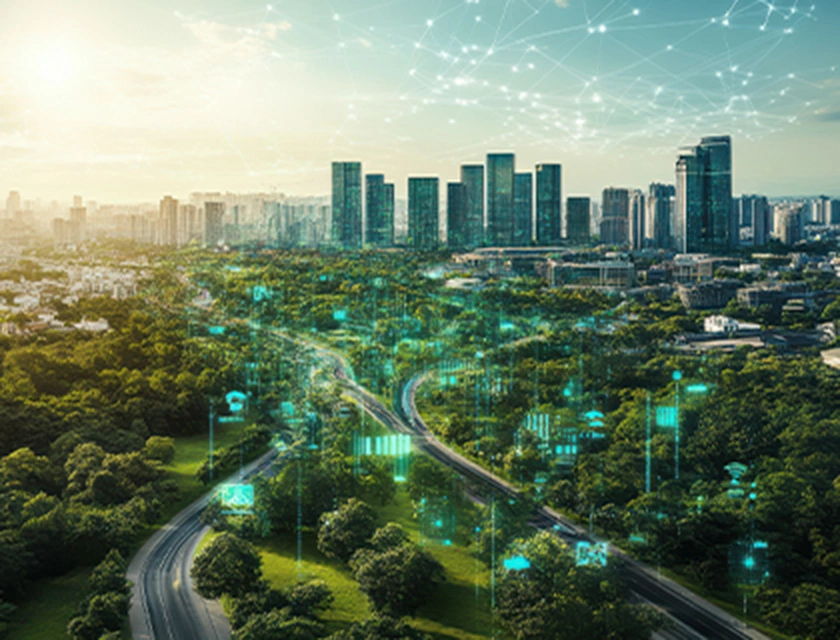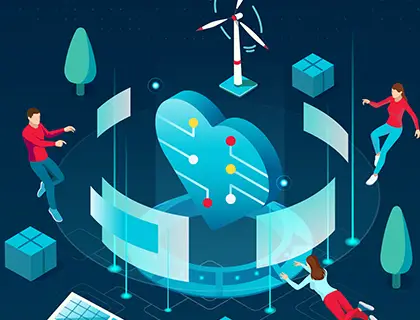
Quantum computing is set to turn the tech industry on its head and its sustainability capabilities will rock things further. Able to perform complex simulations at high speed, the computers will create more efficient and highly analytical climate technologies.
5 Mins
21st October 2024
Article
Sustainability, Quantum-safe network, Network security
Quantum computing is emerging as a technology that will spearhead our progression into a sustainable society. These new, incredibly fast computers can complete calculations at a speed that would otherwise take today’s computers thousands of years.1 It is these calculations that will also enable us to see a way through the complexity of our climate challenges.
These computers’ potential for driving greater sustainability is so powerful that the World Economic Forum identifies it as a key principle in its quantum computing governance guide.2 They note that the rapid evolution in computing that quantum will bring is set to make a considerable impact on improving the state of the world.

This computing evolution will play out in several ways for sustainable tech, most notably in shaving years off technical development and abating the high energy costs of today’s classical computers.
Quantum computing’s sustainability prowess comes from its ability to create calculations, simulations and models at a rate 158 million times faster than any supercomputer we have today.3 These calculations can imagine and test theories of efficiency and operational improvement to ensure sustainable technologies are working to their best ability. That means technologies such as solar panels, electricity storage batteries and hydrogen production could operate at a level that meets all our energy needs and dramatically reduces our reliance on fossil fuels.
Quantum computers can also calculate production models in manufacturing to find greater efficiencies, both in the products and the method in which they’re made. These efficiencies will drive down the cost of production, freeing up capital to invest in further sustainable technologies such as carbon capture.
Quantum computing’s potential to build efficiencies in existing industries is so significant that by 2035, it could abate 7 gigatons of carbon a year, which would achieve the Paris Agreement target of 1.5°C warming.4
Quantum computing is different from classic computers because it uses qubits rather than bits to process information. Whereas bits can only be 0 or 1, qubits can exist in multiple states. This brings about energy efficiency through sheer processing speed as the quantum computer can create calculations far faster than classical computers. One study found that Google’s Sycamore quantum computer required 557,000 times less energy to complete a calculation than a classic supercomputer.5
When a single quantum computer can replace many classical computers, it also reduces CO2 by reducing dependence on hardware production, energy usage and data warehousing.
However, this carbon reduction is offset by the quantum computer’s need to operate at -273°C or absolute zero. This cooling requirement uses plenty of energy but, since the quantum computer does not use or generate heat, the jury is still out on its energy efficiency.6
The sustainability potential for quantum computing is all well, but no revolution is without risk, and no technology has been used in ways that solely benefit humanity. The sheer power of the quantum computer means we need to prepare today for the far-reaching changes that we anticipate for tomorrow.
On a fundamental level, the high cost of a quantum computer will be inaccessible to many companies and governments, increasing the gap in economic and developmental divides. Alongside this, a far greater risk arises from the threat of cyber attacks.
Data protection
Encryption is used extensively to protect data from being compromised. Quantum computing can ‘solve’ encryptions and access the protected data. Where a conventional computer would take 300 trillion years to crack an RSA encryption, a quantum computer could do it in 10 seconds.7
To prepare for this, we must build protections before the risks become widespread. The Quantum-Safe Network is this very protection. The communication network can circumvent potential threats from quantum computers by ensuring the secrecy of encryption keys and using cryptographic techniques that are resistant to quantum attacks. But this is not a method we can set and forget.
Minimising the projected quantum computing threats requires a collective effort from tech companies and enterprises alike, using technologies such as quantum key distribution. This secure communication method can detect attacks, no matter how powerful the adversary’s computer.
Human protection
Today’s encryption is important to human rights because it protects personal data and preserves the right to data privacy, as well as the safety and protection of digital identities.
The World Economic Forum goes as far as to say quantum computing must evolve in a way that ‘preserves human rights’ through standardised training for tech leaders on the values of ethical innovation.2
Quantum computing presents significant sustainability opportunities, particularly in the way it will evolve sustainable technology and find ways to abate carbon emissions.
For businesses considering the opportunities it presents, steps to build a secure evolution into this quantum world must begin today. Only then can the business benefits be unlocked in a way that builds value without presenting risk.
How can your business benefit from the Quantum-Safe Network?
References

5G, Sustainability, Connectivity

Sustainability, Manufacturing and logistics, Smart cities

Sustainability

Sustainability, Transportation, Smart cities

Sustainability, 5G, Manufacturing and logistics

Sustainability
Get the latest digest on business and technology trends straight to your inbox.